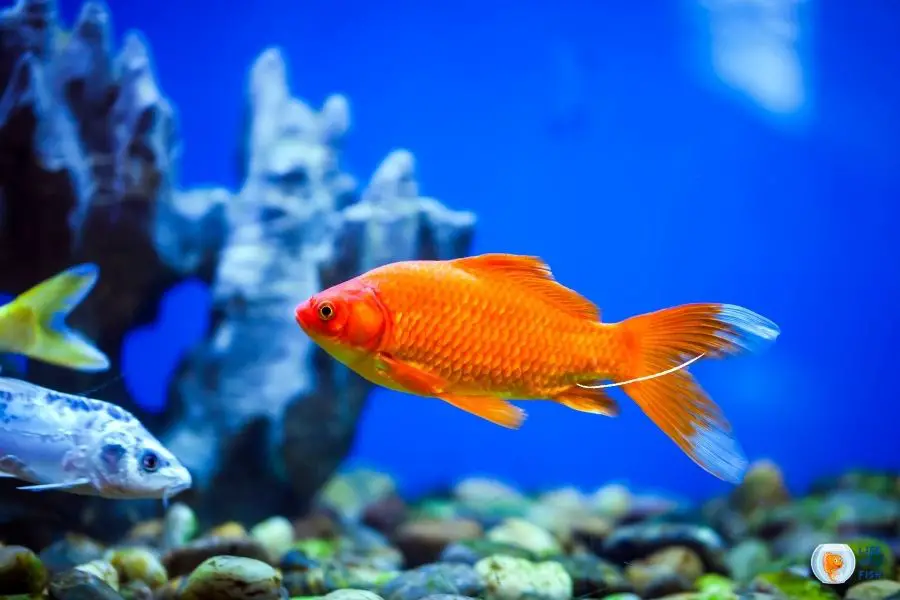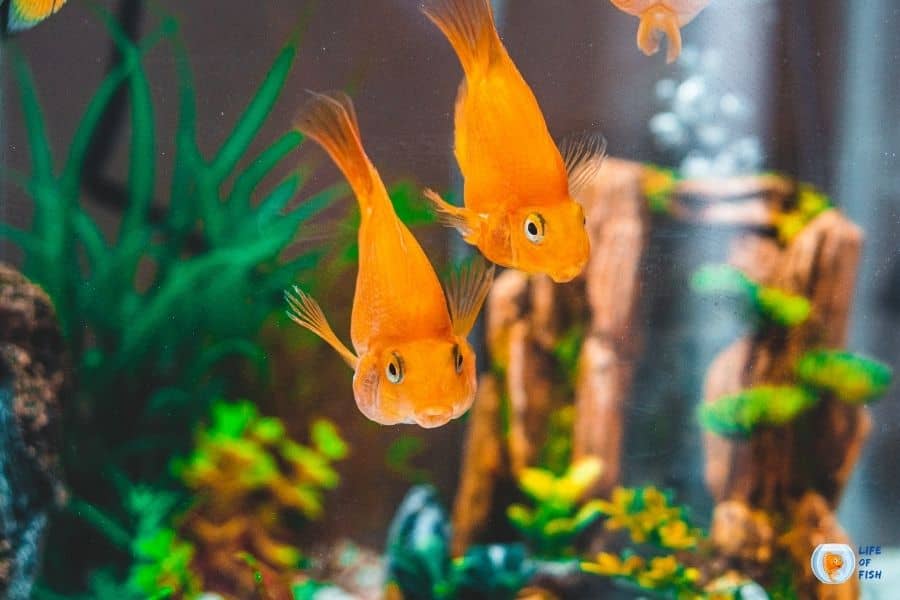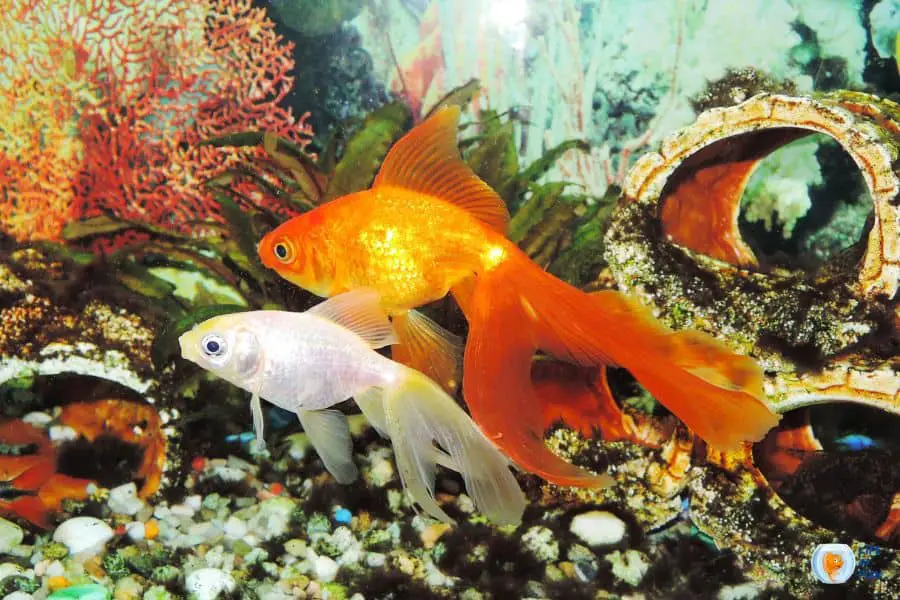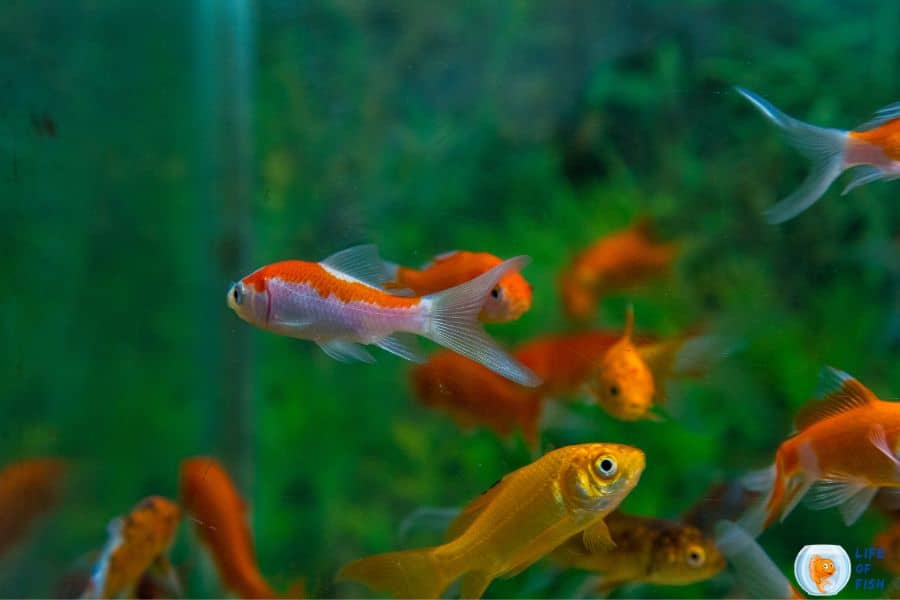For most animals (including humans), poop’s color indicates what is going wrong inside the digestive system. If you see stringy white fish poop, it’s usually a sign that something is amiss with your fish. There are a few different things that can cause stringy white fish poop. And not all of them are a cause for concern. This article will explain everything you want to know about fish poop, the most common causes of stringy white fish poop, and what you can do about them.

About Fish Poop
Jump To
The gastrointestinal systems of fish, people, and other animals are all very similar. The gut is in charge of absorbing nutrients and eliminating waste and indigestible material. A fish’s gut is a simple, curved tube that runs from the mouth to the anus. Along this tube are various organs, including the liver, pancreas, and intestine. The intestine is where most of the absorption of nutrients takes place.
As food moves through the gut, indigestible material is eliminated as waste. This waste material is excreted through the anus as poop. The scientific term for fish poop is “detritus” or “feces.” It is made up of uneaten food, bacteria, scales, skin cells, and other indigestible material.
What Does A Normal Fish Poop Look Like?
The color of fish poop can range from brown to white and everything in between. The color is usually an indication of what the fish has been eating. The normal color of fish poop should be dark brown. However, this can be red, green, or even black, depending on the type of food the fish has been eating. The consistency of fish poop should be firm but not hard. If the poop is hard, it could be a sign of dehydration.
The size and shape of fish poop will also depend on the type of fish. Smaller fish will have smaller poop, while larger fish will have larger poop. The shape of the poop can also be affected by the type of fish. For example, goldfish have long, thin poop while bettas have round pellets. If you see white stringy poop, it’s usually a sign that something is amiss. There are a few different things that can cause stringy white fish poop.

What Causes Stringy White Fish Poop?
There can be several reasons for fish to excrete stringy white fish poop. Let’s start with the least dangerous one.
Fish Hasn’t Eaten Anything.
The most common reason for stringy white fish poop is that the fish has not eaten Anything. If a fish has not eaten for a while, there will be no solid waste to excrete. The only thing that will be excreted is a clear, stringy substance that is made up of digestive enzymes and mucus. This is perfectly normal and is not a cause for concern as some fish species prefer to fast for short periods of time.
The best way to prevent this is to ensure your fish are getting enough food. Feed them small amounts several times a day instead of one large meal. In most cases, stringy white fish poop is nothing to worry about and will go away once the fish starts eating again. You can also try live foods or frozen foods to entice your fish to eat.
Fish Is Suffering From Stress
The second most common reason for stringy white fish poop is stress. Fish are very sensitive to changes in their environment. And even something as small as a new decoration in the tank can cause stress. When fish are stressed, they produce a hormone called cortisol. This hormone lowers the immune system and has been linked to a variety of health issues, including stringy white fish poop.
The best way to prevent stress is to make sure the tank is set up correctly. This includes having the correct water temperature, pH levels, and filter. It’s also important to have hiding places for the fish to feel safe. If you’ve recently added new fish to the tank, make sure they are compatible with the existing fish. Incompatible fish can cause a lot of stress.
You should also avoid moving the tank or changing the decoration too often. This will only add to the stress your fish are already feeling. If you think your fish are stressed, try using a water conditioner that contains aloe vera. This will help to reduce the stress hormone levels and improve the health of your fish.
Fish Is Suffering From A Parasite Infection
Parasite infection is the third most common reason for stringy white fish poop. Fish can be infected with a number of different parasites, including flukes, tapeworms, and nematodes. These parasites live in the fish’s digestive tract and feed off the food the fish eats. This can cause several health problems, including malnutrition, diarrhea, and stringy white poop.
However, parasitic infections are rare in ornamental fish. But, they are common in wild-caught ones. So, if your fish is a wild-caught, it’s more likely to be infected with a parasite. The best way to identify parasites is to look for them in the fish poop. They will appear as small, white, worm-like creatures. The poop will seem to be moving on its own as the parasites crawl around.
Identifying parasites might not be possible in fish tanks. For this, you can take the fish out and put it in a clear cup or jar. Then, look for parasites in the water.
How To Treat Parasitic Infections
If you see any parasites, you’ll need to treat the fish with a parasiticide. There are many different products available, so you’ll need to choose one specific for the type of parasite you’re dealing with. Some popular parasiticide products include Praziquantel, Levamisole, and Fenbendazole. Parasiticides are available in powder or liquid form and can be found at most pet stores.
To treat a fish with a parasiticide, you’ll need to follow the instructions on the product label. This will usually involve adding the product to the tank water. It’s also important to treat the entire tank, not just the infected fish. This is because parasites can often infect other fish in the tank. You should also do a water change and clean the filter to remove any parasites that might be in the tank.
How To Prevent Parasitic Infections
The best method to prevent parasites is to quarantine new fish before adding them to the tank. This will allow you to treat the fish for parasites before they have a chance to infect other fish. You should also avoid buying wild-caught fish. These fish are more likely to be infected with parasites. Finally, you should practice good tank maintenance. This includes doing regular water changes and cleaning the filter. By following these tips, you can help to prevent parasites from infecting your fish.

Fish Is Suffering From A Bacterial Infection
Bacterial infections are a more common cause of white stringy poop in fish than parasitic infections. Symptoms of a bacterial infection include white poop, although not always. Other symptoms include a bloated stomach, swim bladder, dropsy, and rectal infections.
Usually, white stringy poop is a side effect of not eating while suffering from a bacterial infection. The fish’s digestive system slows down, and the poop becomes stringy as a result. If your fish suffers from a bacterial infection, cure it, and the white poop will go away. The best course of action is to take it to the vet so you know which one of these bacterial infections may be the cause.
How To Treat Bacterial Infections
Bacterial infections in fish are usually treated with antibiotics. These can be administered in a number of different ways, including orally, through the skin, or by injection. Common fish antibiotics include kanamycin, amoxicillin, erythromycin, and tetracycline. These are available in a number of different formulations, so you’ll need to choose one that is appropriate for the fish.
To treat a fish with an antibiotic, you’ll need to follow the instructions on the product label. This will usually involve adding the product to the tank water. If in doubt, consult with your vet to determine the best course of action for your fish. Alternatively, you can also try natural cures for bacterial infections. These include using things like garlic, apple cider vinegar, and salt. However, these cures are not always effective.
How To Prevent Bacterial Infections
The easiest method to avoid bacterial diseases is to keep your tank clean. This includes keeping the tank clean and doing regular water changes. You should also avoid overfeeding your fish. This can result in a buildup of toxins in the tank, increasing the risk of infection. Quarantining the new fish rule applies here as well. By quarantining new fish, you can help to prevent them from infecting other fish in the tank.
Non-Disease Reasons For Stringy white fish Poop
There are a number of non-disease reasons why your fish might have white stringy poop. One reason is that the fish are not getting enough food. If the fish are not eating enough, then their digestive system will slow down, and the poop will become stringy. Another reason is that the fish are eating too much. This can lead to excess waste, which can make the poop stringy. Finally, white stringy poop can also be a sign of an unhealthy diet. If your fish is getting too much fat or fiber in their diet, then this can lead to stringy poop. Sometimes, multivitamins and medications also cause stringy poop.
How To Fix The Problem
If you’re sure that the fish are not suffering from a disease, then you can do a few things to fix the problem. First, make sure that you’re feeding the fish enough food. They should be getting two to three meals per day. Second, make sure that you’re not overfeeding the fish. They should only eat as much as they can in a few minutes. Finally, check the ingredients of their food. They should be getting a high quality, low fat, and low fiber diet. By following these tips, you should be able to fix the problem of white stringy poop in your fish.
Conclusion
Most of the time, stringy white poop in fish is nothing to worry about. However, if the fish show other symptoms of illness, you should take them to the vet. Remember, practicing good tank maintenance is the best way to prevent infections. This includes keeping the tank clean and doing regular water changes. You should also quarantine new fish to help prevent the spread of disease. You can help your fish stay healthy and happy by following these tips.

Related question
What Does Red Fish Poop Mean?
Red color fish poop can mean a number of different things. It could be a sign of blood in the stool, which could be caused by a number of different things, including parasites, infection, or inflammation.
It could also be a sign of food intolerance or allergies. But, most of the time, it is nothing to worry about, especially if the poop is pinkish. However, if you notice blood-red poop, you should take your fish to the vet to get a diagnosis.
What Does Green Fish Poop Mean?
Green fish poop can mean that your fish has eaten green plants, pellets, flakes, or algae. It can also be a sign of an infection, such as viral gastroenteritis.
However, most of the time, it is nothing to worry about. If you’re concerned, you can take your fish to the vet for a check-up.
What Does The Parasitic Fish Poop Look Like?
The parasitic fish poop looks like stringy white matter with blood in it. Other symptoms that may accompany it include weight loss, tiredness, and loss of appetite. If you observe these signs in your fish, take them to the vet for an examination.
Why Does My Fish Have A Long Poop?
If your fish is excreting long poop, it is because your fish is constipated. A variety of factors can cause constipation, including a lack of fiber in the diet, dehydration, or an intestine blockage.
If you observe that your fish is having trouble pooping, you should take them to the vet for a check-up.
Credit to : Betta Fish Antibiotics (And How To Use)

